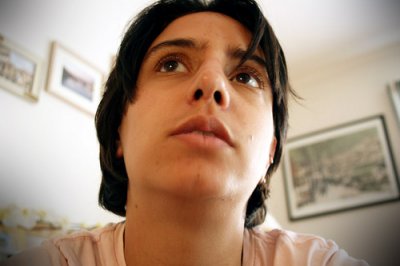Often Afraid? When a Feeling of Fear is a Red Flag

By: Giuseppe Milo
by Andrea M. Darcy
A feeling of fear is normal if we are faced with a real danger. If someone is threatening our wellbeing or the wellbeing of those we love, it’s normal to be afraid.
But if your feeling of fear is triggered by day-to-day life, relationships, or stress? It might be a red flag.
Why am I afraid all the time?
There are several mental health issues that have feelings of fear as a symptom. Below are the most common ones.
[Know your fear is out of control and ruining your life? Time to get support, fast? Find an online therapist now and get talking.]
Anxiety
Is your mind always in the future, worrying about all the things that can go wrong?
Do you sometimes have thoughts that others might call ‘illogic’ or ‘crazy’ but feel real concerns to you? Do you have physical symptoms like muscle tension, stomach issues, headaches, heart palpitations and sweatiness?

By: Caitlin Regan
Anxiety’s trademark is a constant feeling of fear. This is how anxiety differs from depression, where we instead feel hopeless, guilty, and numb.
Post-traumatic stress disorder
Did you experience a traumatic event? And ever since have had fear flood over you when reminded of it?
Post-traumatic stress disorder (PTSD) is not limited to veterans. It can affect anyone who has experienced or witnessed an overwhelming event.
Symptoms of PTSD include feeling on edge, moody, and anti-social, avoiding anything that reminds you of the event, sleeplessness, changes to eating patterns and substance misuse.
Read more in our article, ‘Emotional Shock vs PTSD“.
Childhood trauma
Do you feel intensely fearful over strange things that you never tell anyone about? A stranger staring at you on public transport, someone asking you on a date, strangers trying to hug you?
Childhood trauma, such as child sexual abuse, can leave you with a deep-rooted core belief that the world is a dangerous place. Your unconscious mind will constantly be on the lookout for danger in its effort to protect you from further trauma.
Anxious attachment disorder

By: Aaron Stidwell
Do you not suffer from feelings of fear…. until you try to be in a relationship?
And then suddenly, you are so anxious you can’t sleep at night? You are biting your nails again, endlessly thinking about how perhaps you messed something up the last time you saw him or her?
Or you have serious feelings of panic if you don’t know where they are?
Attachment theory believes that to grow up into confident adults we need to have at least one caregiver as a child we can fully trust to be there for us, and love us no matter what. If for any reason that was compromised for you, you can end up with an attachment disorder, the most common of which is anxious attachment.
Phobias
Is your feeling of fear limited to a certain object or animal? A certain place, a situation itself that you are afraid of? Or even a feeling you don’t want to ever have or you panic?
Even if people tell you you are being silly about it, do you go out of your way to avoid that thing? And when you think about it, do you feel not just fearful, but terrified?
Phobias are actually a kind of anxiety disorder. Social anxiety, for example, is a kind of phobia – we are afraid of connection and intimacy. We can learn phobias from our caregivers growing up, or they can be your unique way of handling a past trauma.
However we ended up with phobias, they are serious and can be increasingly debilitating if we don’t seek help. They do respond well to treatment though, particularly cognitive behavioural therapy (CBT) and, sometimes, exposure therapy.
Paranoia
Do you have fears that other people or organisations are out to get you?
We all sometimes are suspicious or afraid other people. Perhaps they remind us of someone from childhood who treated us poorly. Or perhaps they really are someone to be scared of, and have antisocial personality disorder.
But if your fear and suspicions are so big they haunt your every waking hour and keep you up at night, if others think you are being illogic, and if these fears come after a bout of anxiety, depression, drug use, or a highly stressful experience? Then you might be suffering paranoia.
Borderline personality disorder
Do you have an intense feeling of fear if you think a partner is going to reject or leave you?
To the point you are so terrified your body shakes, or you feel physically ill, or you have to self-harm to feel in control again? Borderline personality disorder rotates around a fear of being abandoned.
Other personality disorders
Does your constant feeling of fear come from the way you see other people and the world, and have you felt that way since you were a young adult?
Personality disorders mean that we simply live life from an entirely different perspective than other people tend to. The personality disorders that can have a feeling of fear as as symptom include:
- avoidant personality disorder
- dependent personality disorder
- obsessive compulsive personality disorder
- schizotypal personality disorder.
Fear, or excitement?
In a new job, and feeling fearful all the time? You might be mistaking fear with excitement.
If we were raised in an environment where one of our caregivers was always saying they were ‘afraid’ of things, then we can take on this behaviour. Instead of recognising that the rush of adrenaline before trying your first dance class, or date with someone you like, is just the excitement of pushing your boundaries and trying something new? You decide you are afraid and back out.
Of course some things, like bungee jumping or driving fast, do have a very real danger attached! So it becomes about asking good questions. (Susan Jeffers’ book, “Feel the Fear and Do It Anyway”, is the classic to read here).
- Is the thing you are afraid of actually dangerous? What facts prove this?
- What are the exact things about it that you fear?
- Do many other people do it all the time with no dangerous result?
- Or is there a calculated risk you don’t feel good about?
- Is there someone you trust who could give you honest feedback about this fear?
Realise your fear is a symptom of something bigger? Ready to finally seek help and move forward? Harley Therapy connects you to top London talk therapists in central London. Not in London or the UK? Our booking platform offers affordable registered therapists across the UK, or online from anywhere.

Andrea M. Darcy is a health and wellbeing writer as well as mentor, trained in person-centred counselling and coaching. She often writes about trauma, relationships, and ADHD. Find her on Instagram @am_darcy





I think I have a fear of work environments because I’ve experienced being sacked twice.
That would make sense if you did then feel fear and anxiety! Worth looking at with a coach or counsellor. You could also look for proof of the opposite – times you were not sacked, or felt good in a work environment?
Great article! You have covered and explained complex diseases through symptoms that people will be able to identify with. The first step in treatment is always recognizing symptoms that need attention. Mental health issues are tricky to identify; people take symptoms lightly as they don’t have the necessary knowledge.
Thanks Iris.
I recently felt very scared of this guy a couple years older than me. He gave me no reason to be scared, and I’ve known him for years. He left our church (which is how I knew him) for a while, and then he came back and I felt very afraid, like he was a threat to me. I can’t explain why. Any advice?